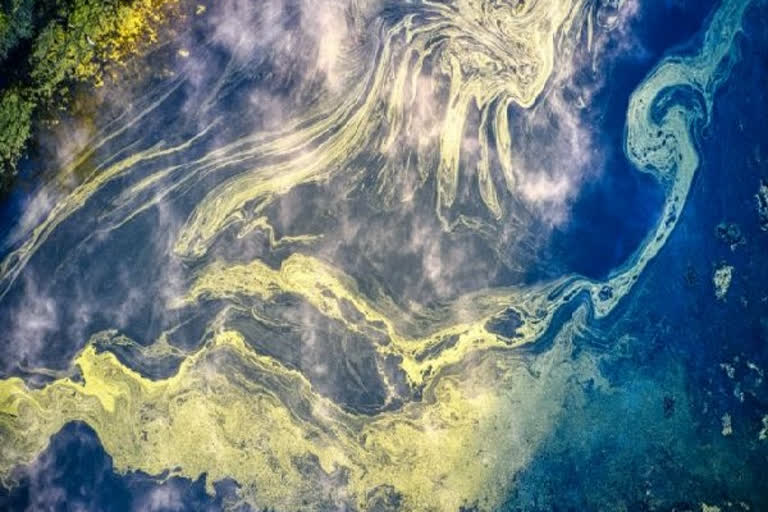Norwich: A research from the University of East Anglia and the Earlham Institute says that global warming is likely to cause abrupt changes to important algal communities because of shifting biodiversity 'break point' boundaries in the oceans. A new study, published today in the journal Nature Communications, finds that as climate change extends the warm hemisphere, these boundaries are predicted to shift pole-wards over the next 100 years.
Instead of a gradual change in microbial diversity due to warming, the researchers suggest it will happen more abruptly at what they call 'break points' - wherever the upper ocean temperature is around 15 degrees on an annual average, separating cold and warm waters.
The UK is one of the areas most likely to be severely affected, and more suddenly than previously thought. But the team says that the changes could be stopped if we act swiftly to halt climate change. Prof Thomas Mock, from UEA's School of Environmental Sciences, said: "Algae are essential in maintaining a healthy ecosystem to balance ocean life. By absorbing energy from sunlight, carbon dioxide, and water, they produce organic compounds for marine life to live off."
These organisms underpin some of the largest food webs on Earth and drive global biogeochemical cycles. Accountable for at least 20 per cent of annual global carbon fixation, temperature changes could have a significant impact upon the algae that our marine systems, fisheries, and ocean biodiversity depend on.
Thomas added, "We wanted to better understand how the climate crisis is impacting algae worldwide from the Arctic to the Antarctic." The research was led by scientists at UEA in collaboration with the US Department of Energy (DOE) Joint Genome Institute (JGI, USA) and the Earlham Institute (UK).
Also Read: Climate change pushes New Zealand to warmest recorded winter
The major study was conducted over more than 10 years by an international team of 32 researchers, from institutions including the University of Exeter in the UK and the Alfred Wegener Institute for Polar and Marine Research in Germany. It involved the first pole-to-pole analysis of how algae (Eukaryotic phytoplankton) and their expressed genes are geographically distributed in the oceans. Thus, the team studied how their gene activity is changing due to environmental conditions in the upper ocean from pole to pole.
As the upper ocean is already experiencing significant warming due to rising CO2 levels, the researchers estimated how the distribution of these algal communities might change based on a model from the Intergovernmental Panel on Climate Change (IPCC) 5th Assessment Report. The algal communities' diversity and gene activity are shaped by interactions with microscopic single-celled organisms, or prokaryotes, as part of complex microbiomes.
The researchers found that these global communities can be split into two main clusters - organisms that mainly live in cold polar and warm non-polar waters. The geographic patterns are best explained by the differences in the water's physical structure (for example, seasonally mixed cold versus permanently stratified warm water) of the upper ocean caused by latitudinal gradients of temperature.
The organisms were analysed through nucleic acids extraction and DNA and mRNA sequencing of samples collected during four research cruises in the Arctic Ocean, North Atlantic Ocean, South Atlantic Ocean, and the Southern Ocean. Prof Mock said: "Significant international efforts have provided insights into what drives the diversity of these organisms and their global biogeography in the global ocean, however, there is still limited understanding of environmental conditions responsible for differences between local species communities on a large scale from pole to pole.
"Our results provide new insights into how changing environmental conditions correlate with biodiversity changes subject to large-scale environmental fluctuation and disturbances. This knowledge is essential for predicting the consequences of global warming and therefore may guide environmental management. "We can expect the marine systems around the UK and other countries on this latitude to be severely affected, and more suddenly than previously thought.
"The largest ecosystem change will occur when marine microalgal communities and their associated bacteria around the UK will be replaced by their warm-water counterparts. "This is expected to be caused by the pole-ward shifting ecosystem boundary or 'biodiversity break point' separating both communities. For this to take place, the annual average upper ocean temperature needs to become warmer than 15C. "It's not irreversible though if we can stop global warming," he added.
"The 'biological carbon pump' whereby the ocean takes up carbon dioxide from the atmosphere will change with this shift in microalgal communities - most likely becoming less effective - which could in turn feedback to amplify global warming."
Also Read: 'Nowhere to run': UN report says global warming nears limits
(ANI)



